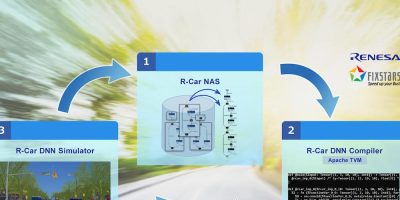Renesas and Fixstars develop tool suite for R-Car SoC-based ADAS
Semiconductor provider, Renesas Electronics and multi-core CPU / GPU / FPGA acceleration technology company, Fixstars are jointly developing a suite of tools that allows optimisation and fast simulation of software for autonomous driving (AD) systems and advanced driver assistance systems (ADAS) specifically designed for the R-Car SoCs from Renesas.
Today’s AD and ADAS applications use deep learning to achieve highly accurate object recognition. Deep learning inference processing requires massive amounts of data calculations and memory capacity. The models and executable programs on automotive applications must be optimised for an automotive SoC, because real time processing with limited arithmetic units and memory resources can be a challenging task, explained Renesas. The process from software evaluation to verification must be accelerated and updates need to be applied repeatedly to improve the accuracy and performance.
The tools will make it possible to rapidly develop network models with accurate object recognition from the initial stage of software development and take advantage of the performance of the R-Car SoC, said Renesas. The intention is to reduce post-development rework in order to shorten development cycles.
The first tool is the R-Car Neural Architecture Search (NAS) tool for generating network models optimised for the SoC. This tool generates deep learning network models that efficiently use the CNN (convolutional neural network) accelerator, DSP, and memory on the R-Car. Engineers can develop lightweight network models that achieve highly accurate object recognition and fast processing time even without a deep knowledge or experience with the R-Car architecture, said Renesas.
Another tool is the R-Car DNN compiler for compiling network models for R-Car
It converts optimised network models into programs that can make full use of the performance potential of R-Car. It converts network models into programs that can run quickly on the CNN IP and also performs memory optimisation to enable high-speed, limited-capacity SRAM to maximise its performance.
Finally, there is the R-Car DNN simulator for fast simulation of compiled programs. It can be used to rapidly verify the operation of programs on a PC, rather than on the R-Car chip. Developers can generate the same operation results that would be produced by R-Car, said Renesas. If the recognition accuracy of inference processing is impacted during the process of making models more lightweight and optimising programs, engineers can provide immediate feedback to model development, therefore shortening development cycles.
“Renesas continues to create integrated development environments that enable customers to adopt the “software-first” approach,” said Hirofumi Kawaguchi, Vice President of the Automotive Software Development division at Renesas. “By supporting the development of deep learning models tailored to R-Car, we help our customers build AD and ADAS solutions, while also reducing the time to market and development costs.”
Genesis for R-Car is a cloud-based evaluation environment which allows engineers to evaluate and select devices earlier in the development cycles. Satoshi Miki, CEO of Fixstars, confirmed: “We will continue to develop new technologies to accelerate machine learning operations (MLOps) that can be used to maintain the latest versions of software in automotive applications.”
The partners also announced the joint Automotive SW Platform Lab, where Renesas and Fixstars will continue to develop software for deep learning and build operation environments that maintain and improve recognition accuracy and continuously updating network models.
The first set of tools available today is designed for the R-Car V4H SoC.




